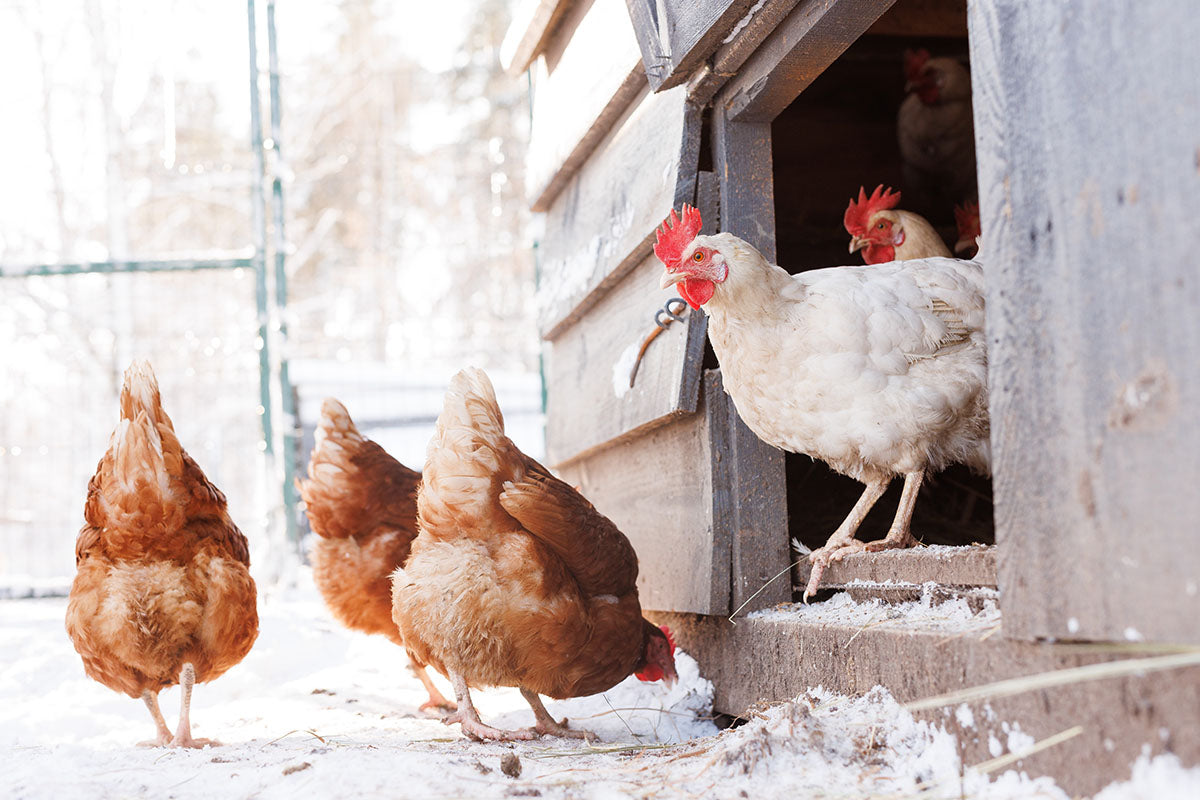
Winter Chicken Care: How to prevent chicken coop fires
As winter sets in with its chilly temperatures and shorter daylight hours, keeping your chickens happy and comfortable is important. While it may be tempting to add extra heating to your coop when the first snow falls, it's important to be aware of potential fire risks. These risks can include heat lamps, faulty wiring, poor electrical setups, and flammable materials — all of which can contribute to dangerous fires.

To keep your chickens safe during the winter, consider exploring more reliable heating alternatives to help prevent chicken coop fires. While raising chickens in chilly temperatures may present unique challenges, it's nothing you can't handle.
Chicken Coop Fire Prevention
Chicken coop fires can occur in an instant. The chicken coop contains various combustible materials, including loose feathers, droppings, and bedding. These components act as fuel and can ignite quickly. Consider these tips to ensure your chickens remain safe during the winter:
-
Install proper equipment. Always use outdoor-rated cords (because they are designed to handle outdoor weather changes), MET-certified products, and GFCI outlets. Also keep a sharp eye out for frayed or worn-out equipment that needs to be replaced.
-
Install battery-powered smoke detectors. Smoke detectors are a great way to ensure that if anything does happen, you can act quickly. Don't forget to change out the battery at least once a year (some recommendations suggest every six months) to ensure your smoke detector is charged and ready.
-
Avoid heat lamps. Heat lamps are the number one reason chicken coop fires occur, and there are better options available. Most people don't realize that a 250-watt heat lamp can reach a surface temperature of up to 500°F. If a heat lamp falls, overheats, or if the bulb breaks, a fire can ignite within seconds. If you choose to use a heat lamp, make sure it's UL safety tested and meant for outdoor use, and check it regularly for wear and tear.
-
Store flammable materials safely. Be sure to store paints, propane, gas, or other flammable materials far away from your chicken coop — not only can they easily catch fire, but they can also cause a dangerous situation if anything accidentally sparks.
-
Clean your coop with care. How often you clean your coop depends on several factors, including the number of chickens you have and the depth and type of bedding you use. Whether you do a deep cleaning weekly, monthly, or a few times a year, the key is to keep your coop dry and free from old bedding, excessive droppings, feathers, and other debris that may pose a fire hazard.
-
Watch for ongoing rodent activity. Keep an eye out for mice or other small animals that may chew on exposed cords or wires within your coop. Small creatures usually leave telltale signs such as small droppings and possible nests.
Safe Heating Options for Chicken Coops
Most chickens thoroughly enjoy a sunny, warm day. Who doesn't? Surprisingly, most chickens actually do quite well in cold, winter weather. They're hardy birds by nature! While some breeds may be less tolerant of the cold than others, most birds can handle winter weather just fine. However, there are a few simple things you can do to keep your flock safe and warm when the temperatures drop:
-
Provide a comfortable environment. Chicken coops come in all shapes and sizes, but it's essential that yours is well-ventilated, draft-free, and well-insulated to prevent moisture buildup and to protect against extreme cold.
-
Supply warm bedding. Whatever bedding you choose, create a nice, deep layer that will keep your chickens warm and happy.
-
Maintain foot health. If the temperature drops too low, chickens can suffer from frostbite as well as potentially freeze to any metal surfaces, so it's imperative to have a safe place for your chickens to perch. Roosting bars or chicken perches give your chickens a warm place to relax away from cold surfaces.
-
Nourishment is essential for warmth. A good diet is necessary to keep your chickens comfortable and warm in the winter. Eating well helps your chickens to feather out, which keeps them warm in lower temperatures. A quick feeding or snack just before bed can even boost your chickens' ability to stay warm when the sun goes down.
-
Manage water supply. Adult chickens consume about a pint of water each day, depending on the weather and the appetite of your birds. When the temperatures drop too low, your chickens' water supply can freeze, so it's essential to provide a heated waterer to ensure proper hydration at any time of day. The K&H Poultry Waterer, featuring a no-roost top, no-spill cap, filtered water tray, rust-resistant construction, and an easy-carry handle, is a perfect addition to any chicken coop.
-
Create warming stations. During the winter, a heating source can offer your chickens a warm place to rest. For the first 5 or 6 weeks, a brooder will keep chicks toasty warm — essential for young chicks with immature feathers. The K&H Thermo-Poultry Brooder features an adjustable height and angle design, a wipe-clean surface, and doesn't require additional maintenance, making it the perfect solution.
As your chickens grow, consider adding a heating pad option after they're at least 1 month old. The K&H Thermo-Peep Heated Pad is designed for indoor or outdoor use and features an internal thermostat to ensure it maintains a perfect temperature. As an added benefit, it can be used on the floor or mounted on the wall.
Keep in mind that all K&H products listed are MET certified and meet or exceed UL safety standards. You should always check for the MET certification to ensure any product used around your flock is safe and durable for its use — anything less can be a fire hazard.
Keeping Chickens Warm and Safe in the Winter
Keeping your chickens safe and comfortable becomes even more important during the colder months, especially when temperatures drop to extreme lows. While heating the coop can help, it also brings a real risk of fire. The good news is, with a bit of research and the proper setup, you can keep your flock warm all winter without the risk of fire.
This article is the final in a series to help you care for your chickens during the winter. If you missed the first two installments, check out Winter Chicken Care: How to Safely Winterize Your Chicken Coop and Winter Chicken Care: Are Heated Dog Bowls Safe for Chickens?



